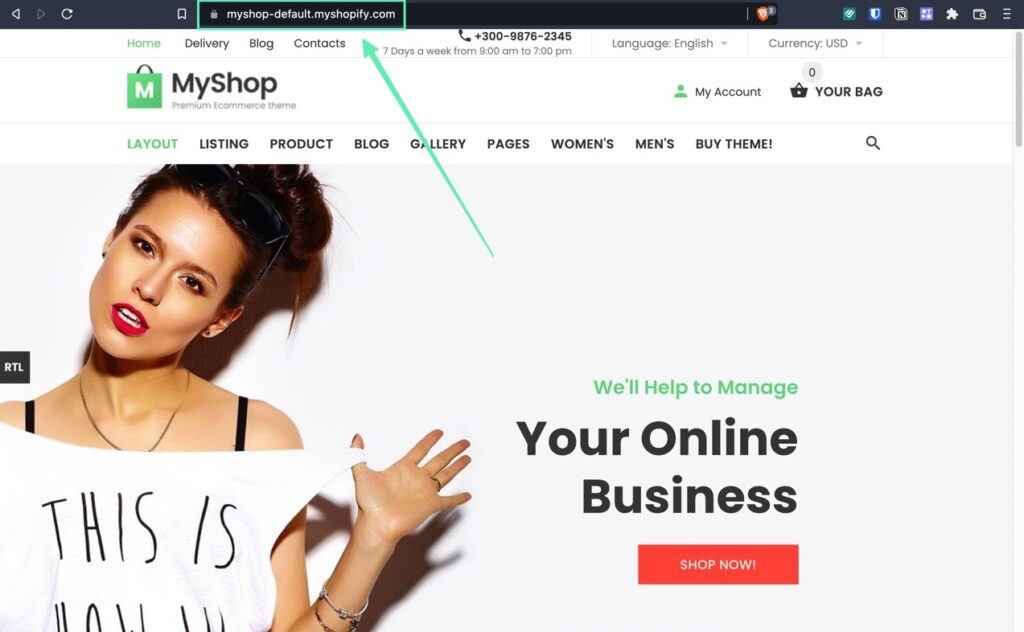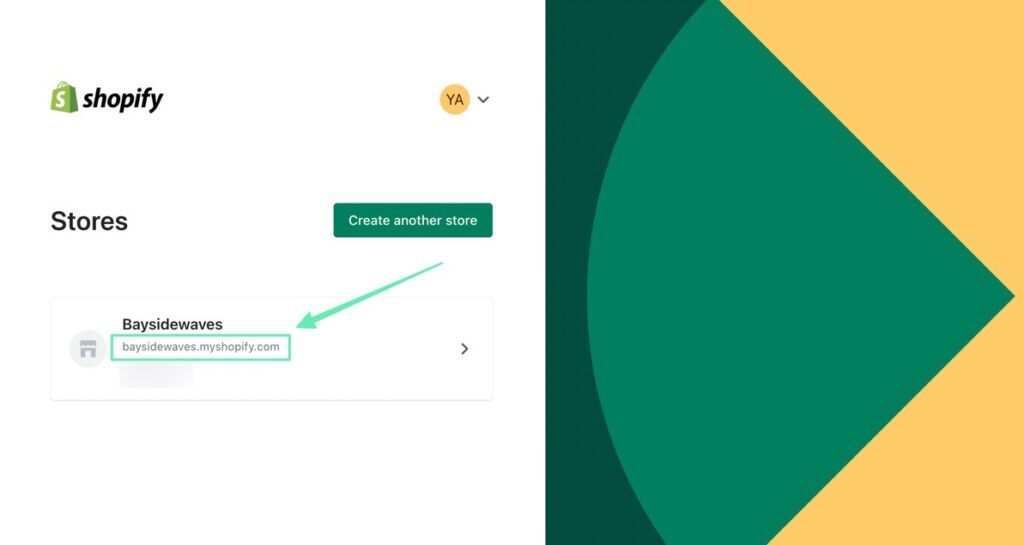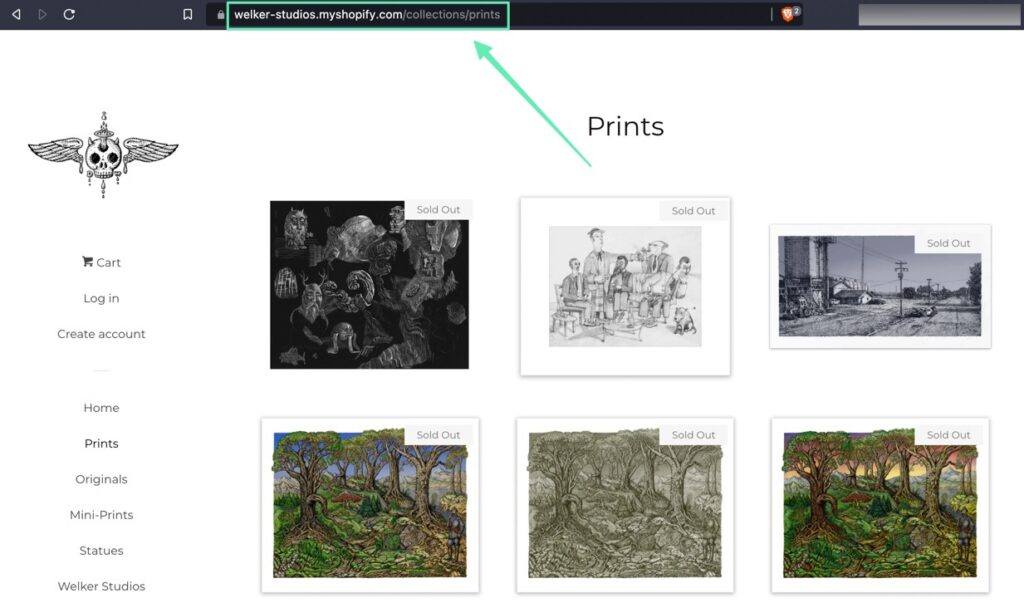What is MyShopify? And MyShopify.com? How is it different from any Shopify online store?
In this article, we explain the exact purpose of MyShopify to ensure all store owners are clear about its functionality, what to do if you encounter a MyShopify.com URL, and how the checkout works on a MyShopify website.
First Thing's First: What is MyShopify?
MyShopify is a free URL provided when you create an account with the Shopify ecommerce platform.
As with all online stores and websites, you need a domain name, so Shopify gives you a free one, or at least a free sub-domain.
That sub-domain looks something like this: yourstorename.myshopify.com.

During the Shopify signup process, merchants pick a store name, which replaces the “storename” part of the MyShopify domain listed above.
As such, this allows merchants to technically launch a live Shopify store without buying or transferring over a custom domain name. It also means free-trial users can play around with the Shopify interface, and see a live version of their site on the internet, without having to type in credit card information.
In short, MyShopify is a feature offered by the Shopify ecommerce platform to serve up a live site without any extra payment from the merchant. The feature comes in the form of a sub-domain, which merchants can either stick with or change later on in favor of a custom domain for their ecommerce store.
Is MyShopify a Scam?
This question comes up a lot for some reason, mainly from customers online who don't understand that it's actually just a sub-domain from a legitimate ecommerce platform.
So, no, MyShopify is not a scam; it's a highly useful feature for testing the Shopify frontend and backend interfaces, while also giving some brands a free way to publish an online store.
So, if you see a MyShopify.com website, it's most likely a young or startup company that's still in the process of building their website. However, it's completely possible that the seller decided to stick with the sub-domain provided by Shopify.com, so you shouldn't worry about any scams.
We should, however, mention that just because MyShopify isn't a scam doesn't mean the company behind that URL is legitimate. They could absolutely be scammers. But that goes for all domains, so it has nothing to do with MyShopify. You also may find that some MyShopify websites are far from finished, so you might not see a fully functioning site. That doesn't mean it's a scam, but you shouldn't expect to purchase products.
What's most likely happening when you encounter a MyShopify.com domain?
- The website isn't yet ready, and therefore doesn't have a custom domain.
- We've found that many artists, bands, and creatives opt for the MyShopify domain name since it's free.
- Many dropshippers use MyShopify.com, which is fine, but there are downsides to buying from a dropshipper: Mainly, long shipping times, or the potential for fraud.
- The website is defunct, and no longer gets maintained. Or the company decided not to continue using Shopify, therefore abandoning the website.
- Some Shopify theme developers use MyShopify for demos.

Are These Sub-domains Suitable for Real Businesses?
Everyone technically has a MyShopify store after creating a Shopify account. So, yes, it's entirely fine for a real business to have that type of domain. But the real question is whether or not the MyShopify.com sub-domain is suitable to grow your business. Will it cause problems with your customers? SEO? Website speed?
There's nothing “lesser” about a MyShopify domain when it comes to functionality. Your Shopify store works the same. You won't see slower speeds, and you can process payments just like any other business.
In fact, if you're a paying Shopify subscriber, you technically own that domain. However, the Shopify branding always lingers inside the sub-domain, so you're not doing yourself any favors there.

So, is the MyShopify domain suitable for a real online business? We'd argue no. In fact, absolutely not, unless, of course, you're using it for development and testing. And here are the main reasons:
- You're losing brand identity: Everyone that comes to your site sees the “.myshopify.com” part of your domain and immediately thinks about Shopify, instead of your own brand. That's not a good place to start when establishing a brand image is so important in today's competitive world of online commerce.
- Some people still think it's a scam: Although we talked about how it's not a scam, there are plenty of people who immediately think you're running a shady business.
- The stigma isn't entirely unwarranted: MyShopify isn't a scam, but many online reviews state that MyShopify domain names tend to belong to seedy dropshippers who are too cheap to pay for a custom domain name. This means that consumers associate MyShopify with long shipping times, bad customer support, and brands that only take advantage of dropshipping because of the low pricing.
- Custom domains are so cheap: You really must pay for a custom domain name if you plan on growing a business. That's one of the first expenses, and it's a small one. If you can't afford $10 USD per year to add a creative domain to your website, we find it hard to believe you'd advanced past that point.
- You're not doing yourself any favors with SEO: We'll cover SEO in the section below, but you can bet that a custom domain will provide stronger results in terms of SEO.
- Shopify doesn't even want you to keep the MyShopify domain name: It's meant for testing, and to give merchants a free store for a short period of time. In fact, Shopify wants you to buy a custom domain name through them, not stick with the second-rate MyShopify.com domain name that's only meant as a temporary home for your website.
Are These Sub-Domains Good or Bad for SEO?
They're not inherently bad, but for online shopping in particular, you don't really want a sub-domain from your ecommerce platform.
Online consumers try to avoid questionable websites, plain and simple. If the HTTPS is missing from the domain name, many people know to move on. Savvy consumers are aware of the risks of online shopping, so there's no reason to type your personal financial information into a site if it's clearly lacking a secure checkout, PCI compliance, or an SSL certificate.
Those same consumers tend to sniff out scammy-sounding URLs, and they most likely wouldn't understand why a legitimate business would utilize a sub-domain from an ecommerce platform, considering those are usually reserved for people running personal blogs or online journals.
Due to that type of reaction, you can absolutely bet that SEO gets affected by a MyShopify storefront. Because fewer people are bound to click on your URL. And that affects SEO, since Google now sees that users aren't willing to visit your site, or they're hesitant to move around and purchase products.
But what if you can convince your customers that the domain is fine? Will the MyShopify domain ever show up on Google? Or does it have some sort of red flag on it that tells Google it shouldn't be taken seriously?
The answer is yes, subdomains most likely won't end up on the front page of Google. Subdomains from your own custom domain may have a chance, but you're taking a wild shot when using one from an ecommerce platform or website builder. Some experts even argue that content on a subdomain is basically useless for SEO. That's because subdomains are viewed differently by Google. They're either seen as separate from “real” URLs or offered by website builders for the purpose of free websites.

Overall, Google and Shopify have an expectation for businesses to eventually shift over to custom domains. These sub-domain things aren't designed for running full-fledged online stores. You may get indexed by Google if you run a simple blog on a sub-domain, but only if it randomly gets popular for some reason. Otherwise, Google is well aware that the MyShopify sub-domain has little purpose besides giving new Shopify customers a way to launch a website without paying any money. Google gives points to companies that shift to custom domains because those are seen as legitimate, the brands that are moving forward to build their businesses.
Can Customers Still Make Purchases on MyShopify Websites?

That depends. The site owners must have set up a payment gateway to process transactions. In addition, they must have products configured for purchase. They also need to have an account in good standing with Shopify, or one that they pay for on a monthly basis. If one of these requirements aren't met, you can bet that any transactions you attempt on a MyShopify site won't go through. The customer will either receive an error within the checkout module or never get there to begin with.
However, many dropshippers and artists are known for using MyShopify domains, so it's entirely possible to sell products under a MyShopify domain name.
For merchants, we suggest you use this knowledge by not necessarily trying to sell products to your customers, but to troubleshoot your checkout's interface and actually run mock transactions before launching a new store for the entire world to see.
Essentially, MyShopify gives you that test environment. Pair that with the Shopify Payments processing system and you can actually type in a test credit card number to process a transaction. This then triggers things like transactional emails and fulfillment processes. It's a real-world testing situation for stores that almost always need to run through those tests prior to showing their customers the interface. But that's all it's for. You're not really supposed to launch a site with the MyShopify domain and accept payments from real customers.
Therefore, we recommend keeping your Shopify store private while completing these test transactions. There's a small chance someone finds your store through Google while using MyShopify.com, so you're better off hiding it, just in case.
The Final Word on MyShopify
If you're a consumer who landed on a myshopify.com website, you can rest easy knowing it's not immediately a scam. However, keep your eyes peeled. Check the site to look for any other strange elements. You may be dealing with a small business that doesn't know about the power of custom domains, or they may not have completed the site, so there's no reason to shop from it, anyway. If you really see something you like on a website, and it has a MyShopify domain, search the domain in Google to see if anyone else has experiences with the company. See if they have any social media pages; are they active on those pages like Facebook and Twitter? Can you reach out to the customer care team to ask questions, or is it just a wasteland of random products listed with no support? You might even find a TrustPilot page for the brand if it has generated enough praise or complaints, so take a look at that site.
As for merchants, we can't help but recommend against using a MyShopify.com domain name due to the inherent stigma that comes with it. It's not the wrong product for testing and launching your store. For all of that, it's nice to have a sub-domain that people probably won't find, yet still allows you to publish content online. You can even manage that sub-domain from the Shopify app; all the features are included.
But once you want to truly launch the store—once you're ready to build your brand, sell products, and scale up your business—it's time to ditch the MyShopify domain name for something more suitable. In that situation, learn how to buy and choose a domain name to help your business stand out.
Without a custom domain, you risk:
- Hurting your SEO.
- Alienating your customers, or making them scared to come to your site.
- Hindering the potential for your brand by advertising the Shopify name every time someone comes to your site.
- Making it more difficult for people to type in the domain name, since sub-domains have two parts and are usually longer than custom domain names.
- People thinking you're only a dropshipping company.
- People thinking you're running a hobby store.
For all of those reasons, it's wise to use MyShopify for what it is: a testing sub-domain.
Forget about saving $10 per year. It's not worth it. You can buy a custom domain right through Shopify, and many other domain name registrars sell wonderfully creative names that will match your business. That's when you can really start connecting with your customers. That's when you truly have a name to call your own.
If you have any questions about the purpose of MyShopify, or if you have experience with a MyShopify domain name, drop us a line in the comments section below.




Comments 0 Responses